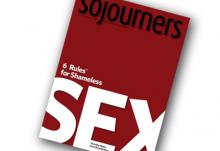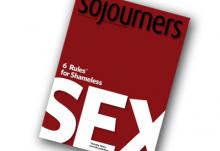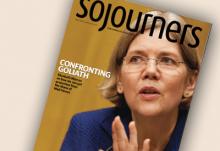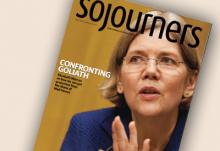Feature
For 2,000 years, everywhere Jewish people went, they have suffered. They have been discriminated against. They have been attacked. You can think of all the things that they’ve experienced, leading up to the Holocaust. For me, as a Palestinian, my engagement in nonviolence should also be to address the issues that prevent Israelis from being what they should be, to be able to see themselves as humans who have dignity, who should have respect in the international community.
It has not been an easy process for me to engage in this. It led me to Auschwitz and Birkenau, where I have visited twice. Once, outside of Birkenau, we were sitting in the grass in a circle and reflecting on our experience. Busloads of Israeli children came in, because every Israeli child of 13 to 16 years gets the chance to come and visit Auschwitz with his or her school. They got off the bus and began walking on the railroad track with their Israeli guides. They had big Israeli flags wrapped around them, and they were singing nationalistic Hebrew songs.
After they finished visiting the different sites, they came back and sat in circles, and they began talking about what they’d experienced. The Israeli guides were standing in the middle of the circles, and all of them were saying the same thing. They were saying, “See what happened to us? You see what the Nazis did to us?” Many of these children probably had their grandparents or great uncles and aunts killed in these camps. Afterward, when they’re sitting in the circle, you can see how the experience was very traumatizing for them. You would assume that these guides would take this as an opportunity to say, “Never again.” But their message was: “You see what the Germans did to us? Well, guess what? It’s not over. If they have a chance, the Palestinians will do exactly the same thing to us as the Nazis did.”
As the nations of the world review the nuclear Non-Proliferation Treaty (NPT) in May at the United Nations, they gather at a time of unprecedented hope for genuine progress toward disarmament. The new receptivity to nuclear abolition is reflected in the “New START” treaty between the United States and Russia, and was sparked by private initiatives led by former U.S. Secretary of State George Shultz and other senior security experts and officials in many countries.

A veteran activist speaks with a new generation of Christian justice workers.

A Toronto church wall speaks to the vibrancy of faith, thanks to the work of four aerosol artists.

Today's Jewish social justice movement is renewing its strength with faith and grassroots power.

Geneticist Francis Collins -- new director of the National Institutes of Health -- talks about faith, science, and the spiritual practices that sustain him.

What is the connection between a mother in Pennsylvania and a mother in northern Canada?

Women's advocacy groups in Kenya take on the issues that most hit home.
Because there are so many different facets of social justice, there’s no one formula for picking a school that values it.

Churches Supporting Churches gets congregations into partnership -- and policy.

A program that educates Iraqi students in the U.S. is helping to rebuild Iraq, one student at a time.







